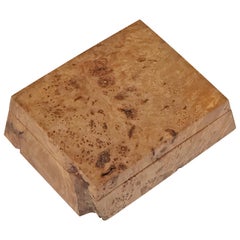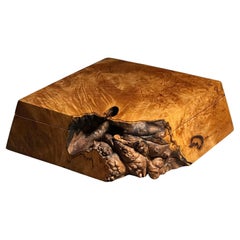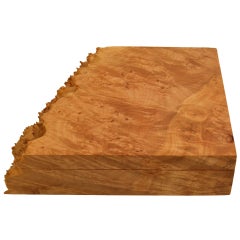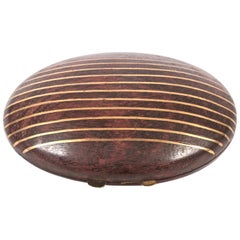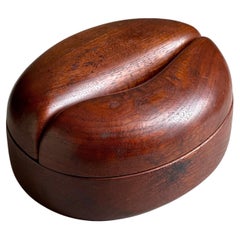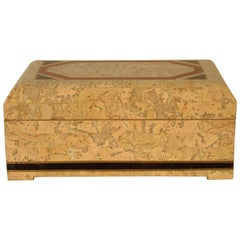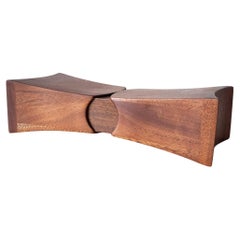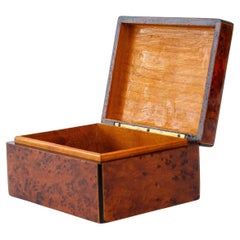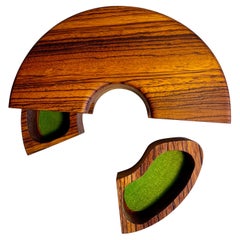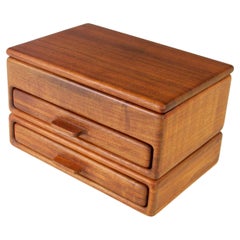American Craftsman Jewelry Boxes
Inspired by the Arts & Crafts style in England, which rebelled against the mechanization of the Industrial Revolution with a proud emphasis on handcrafted design, American Craftsman style similarly pushed against the lavishness of the Victorian era. Coined by Wisconsin-born Gustav Stickley, a furniture designer and publisher of The Craftsman magazine, American Craftsman furniture would influence homegrown styles that followed, such as Mission and the Prairie School.
Like the popular early 20th-century Craftsman houses — which feature meticulous woodwork on everything from built-in bookcases in the living room and cabinetry in the kitchen to earth-toned exteriors with exposed rafters — American Craftsman furniture was all about handmade storage cabinets, bedroom furniture, chairs and other pieces built with organic materials. “Simplicity and straightforwardness of construction has always been the leading characteristic of Craftsman furniture,” Stickley stated. And while he is often credited with most of the designs at the Craftsman Workshops in Eastwood, New York, others such as Harvey Ellis were influential in shaping the straight-backed chairs, beds with vertical slats and tables with exposed joinery that came to define the style.
Highly utilitarian with no unnecessary flair, American Craftsman furniture was designed to emphasize the essence of its modest construction and promote the natural beauty of the wood. Solid oak, cherry, walnut and mahogany were all favored by the movement’s principal figures. Another attribute commonly associated with the style is the integration of subtle details like tooled leather, inlaid metal and hammered iron handles.
Owing to the outbreak of World War I, the popularity of American Craftsman style waned as consumer spending dropped and furniture companies shifted to the production of wartime materials and goods specified in government contracts. Yet, by the 1960s, there was a renewed appreciation for this foundational modern American style, with Stickley and his contemporaries in demand for the clean, simple lines and sturdy construction of American Craftsman furniture.
Find a collection of antique American Craftsman chests, nightstands, seating, decorative objects and more furniture on 1stDibs.
20th Century American American Craftsman Jewelry Boxes
Burl
1980s American Vintage American Craftsman Jewelry Boxes
Birdseye Maple
Late 20th Century American American Craftsman Jewelry Boxes
Burl
Mid-20th Century American American Craftsman Jewelry Boxes
Brass
1970s American Vintage American Craftsman Jewelry Boxes
Walnut
1980s American Vintage American Craftsman Jewelry Boxes
Stone
1970s American Vintage American Craftsman Jewelry Boxes
Wood
1920s Austrian Vintage American Craftsman Jewelry Boxes
Wood, Maple
Mid-20th Century Italian American Craftsman Jewelry Boxes
Acrylic, Lucite, Plexiglass
1830s English Antique American Craftsman Jewelry Boxes
Brass
Mid-20th Century Italian American Craftsman Jewelry Boxes
Alabaster, Marble, Onyx
21st Century and Contemporary American American Craftsman Jewelry Boxes
Coral
Mid-20th Century Italian American Craftsman Jewelry Boxes
Acrylic, Lucite, Plexiglass
1970s French Vintage American Craftsman Jewelry Boxes
Wood
Late 20th Century American American Craftsman Jewelry Boxes
Burl
Mid-20th Century American American Craftsman Jewelry Boxes
Wood, Oak, Burl
Early 20th Century French American Craftsman Jewelry Boxes
Birdseye Maple
Late 20th Century Unknown American Craftsman Jewelry Boxes
Wood
1990s American American Craftsman Jewelry Boxes
Zebra Wood
Mid-20th Century American American Craftsman Jewelry Boxes
Walnut
1930s American Vintage American Craftsman Jewelry Boxes
Wood
1990s American American Craftsman Jewelry Boxes
Oak, Walnut
Early 20th Century American American Craftsman Jewelry Boxes
Sterling Silver
1980s American Vintage American Craftsman Jewelry Boxes
Birdseye Maple, Maple
1960s American Vintage American Craftsman Jewelry Boxes
Burl, Ebony
1960s American Vintage American Craftsman Jewelry Boxes
Walnut, Oak, Velvet
